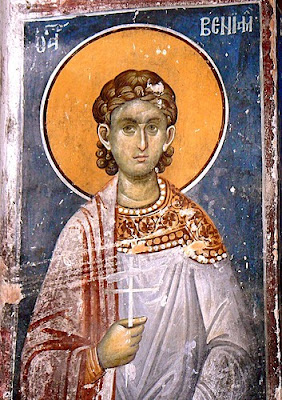 |
| St. Benjamin the Deacon of Persia (Feast Day - October 13) |
Verses
Benjamin is a sheep but not a wolf,
Who was seized by wolves and sacrificed but does not sacrifice.
Who was seized by wolves and sacrificed but does not sacrifice.
By Theodoret of Cyrus
Ecclesiastical History (Bk. 5, Ch. 38)
At this time Isdigirdes, King of the Persians, began to wage war against the churches and the circumstances which caused him so to do were as follows. A certain bishop, Abdas by name, adorned with many virtues, was stirred with undue zeal and destroyed a Pyreum, Pyreum being the name given by the Persians to the temples of the fire which they regarded as their God.
From this beginning arose a tempest which stirred fierce and cruel waves against the nurslings of the true faith, and when thirty years had gone by the agitation still remained kept up by the Magi, as the sea is kept in commotion by the blasts of furious winds. Magi is the name given by the Persians to the worshipers of the sun and moon but I have exposed their fabulous system in another treatise and have adduced solutions of their difficulties.
On the death of Isdigirdes, Vararanes, his son, inherited at once the kingdom and the war against the faith, and dying in his turn left them both together to his son. To relate the various kinds of tortures and cruelties inflicted on the saints is no easy task. In some cases the hands were flayed, in others the back; of others they stripped the heads of skin from brow to beard; others were enveloped in split reeds with the cut part turned inwards and were surrounded with tight bandages from head to foot; then each of the reeds was dragged out by force, and, tearing away the adjacent portions of the skin, caused severe agony; pits were dug and carefully greased in which quantities of mice were put; then they let down the martyrs, bound hand and foot, so as not to be able to protect themselves from the animals, to be food for the mice, and the mice, under stress of hunger, little by little devoured the flesh of the victims, causing them long and terrible suffering. By others sufferings were endured even more terrible than these, invented by the enemy of humanity and the opponent of the truth, but the courage of the martyrs was unbroken, and they hastened unbidden in their eagerness to win that death which ushers men into indestructible life.
The king also seized and imprisoned a deacon of the name of Benjamin. After two years there came an envoy from Rome, to treat of other matters, who, when he was informed of this imprisonment, petitioned the king to release the deacon. The king ordered Benjamin to promise that he would not attempt to teach the Christian religion to any of the Magi, and the envoy exhorted Benjamin to obey, but Benjamin, after he heard what the envoy had to say, replied, "It is impossible for me not to impart the light which I have received; for how great a penalty is due for the hiding of our talent is taught in the history of the holy gospels." Up to this time the King had not been informed of this refusal and ordered him to be set free. Benjamin continued as he was wont seeking to catch them that were held down by the darkness of ignorance, and bringing them to the light of knowledge. After a year information of his conduct was given to the king, and he was summoned and ordered to deny Him whom he worshiped. He then asked the king "What punishment should be assigned to one who should desert his allegiance and prefer another?" "Death and torture," said the king. "How then" continued the wise deacon, "should he be treated who abandons his Maker and Creator, makes a God of one of his fellow slaves, and offers to him the honor due to his Lord?" Then the king was moved with wrath, and had twenty reeds pointed, and driven into the nails of his hands and feet. When he saw that Benjamin took this torture for child's play, he pointed another reed and drove it into his private part and by working it up and down caused unspeakable agony. After this torture the impious and savage tyrant ordered him to be impaled upon a stout knotted staff, and so the noble sufferer gave up his spirit.
Innumerable other similar deeds of violence were committed by these impious men, but we must not be astonished that the Lord of all endures their savagery and impiety, for indeed before the reign of Constantine the Great all the Roman emperors wreaked their wrath on the friends of the truth, and Diocletian, on the day of the Savior's passion, destroyed the churches throughout the Roman Empire, but after nine years had gone by they rose again in bloom and beauty many times larger and more splendid than before, and he and his iniquity perished.
These wars and the victory of the church had been predicted by the Lord, and the event teaches us that war brings us more blessing than peace. Peace makes us delicate, easy and cowardly. War whets our courage and makes us despise this present world as passing away. But these are observations which we have often made in other writings.



